#retcons
Text
Honestly, my only real issue with Tears of the Kingdom's various retcons is that "Purah Pad" sounds like it should be the name of a celebrity-endorsed menstrual hygiene product.
#gaming#video games#the legend of zelda: tears of the kingdom#legend of zelda#tears of the kingdom#zelda#totk#retcons#nameology
1K notes
·
View notes
Note
What did you think of X-Men Blue Origins?
(I may turn this into a People's History of the Marvel Universe later today, so keep an eye on this space.)
X-Men Blue: Origins and the Power of the Additive Retcon
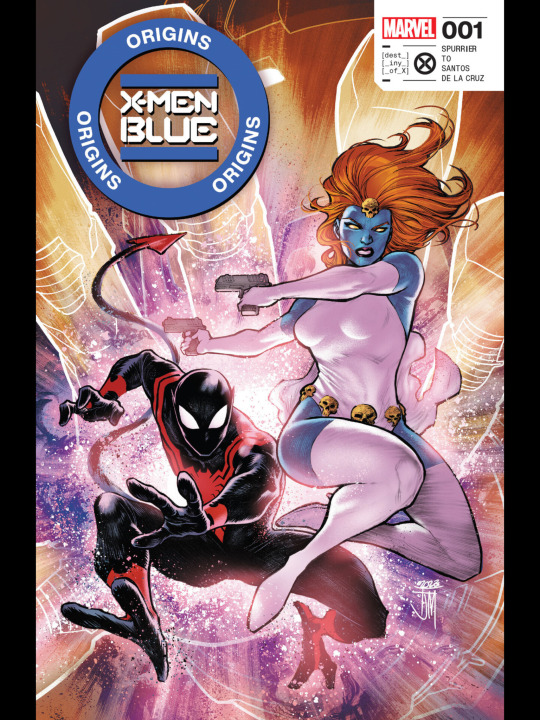
(WARNING: heavy spoilers under the cut)
Introduction
If you've been a long-time X-Men reader, or you're a listener of Jay & Miles or Cerebrocast or any number of other LGBT+ X-Men podcasts, you probably know the story about how Chris Claremont wrote Mystique and Destiny as a lesbian couple, but had to use obscure verbiage and subtextual coding to get past Jim Shooter's blanket ban on LGBT+ characters in the Marvel Universe.
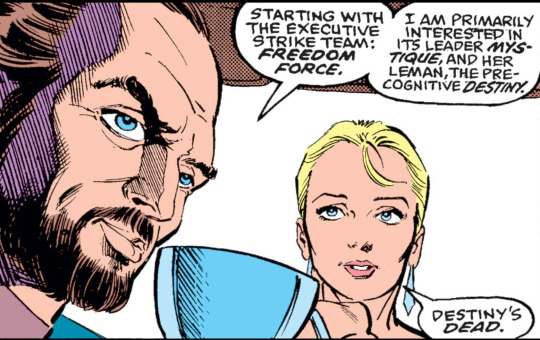
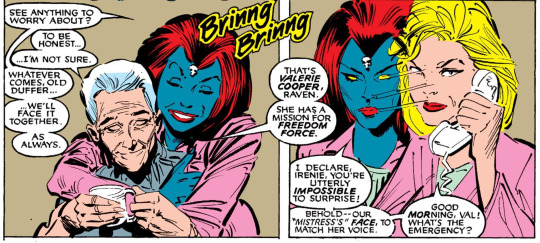
Likewise, you're probably also familiar with the story that, when Chris Claremont came up with the idea that Raven Darkholme and Kurt Wagner were related (a plot point set up all the way back in Uncanny X-Men #142), he intended that Mystique was Nightcrawler's father, having used her shapeshifting powers to take on a male body and impregnate (her one true love) Irene. This would have moved far beyond subtext - but it proved to be a bridge too far for Marvel editorial, and Claremont was never able to get it past S&P.
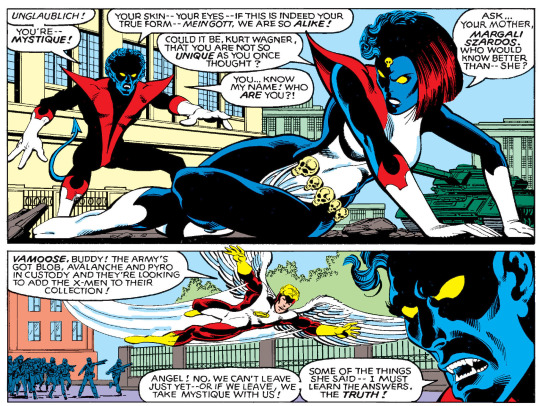
This lacuna in the backstories of Kurt and Raven - who was Kurt's father? - would remain one of the enduring mysteries of the X-Men mythos...and if there's one thing that comic writers like, it's filling in these gaps with a retcon.
Enter the Draco
Before I get into the most infamous story in all of X-Men history, I want to talk about retcons a bit. As I've written before:
"As long as there have been comic books, there have been retcons. For all that they have acquired a bad reputation, retcons can be an incredibly useful tool in comics writing and shouldn’t be dismissed out of hand. Done right, retcons can add an enormous amount of depth and breadth to a character, making their worlds far richer than they were before. Instead, I would argue that retcons should be judged on the basis of whether they’re additive (bringing something new to the character by showing us a previously unknown aspect of their lives we never knew existed before) or subtractive (taking away something from the character that had previously been an important part of their identity), and how well those changes suit the character."
For a good example of an additive retcon, I would point to Chris Claremont re-writing Magneto's entire personality by revealing that he was a Jewish survivor of the Holocaust. As I have argued at some length, this transformed Magneto from a Doctor Doom knockoff into a complex and sympathetic character who could now work as a villain, anti-villain, anti-hero, or hero depending on the needs of the story.
For a good example of a subtractive retcon, I would point to...the Draco. If you're not familiar with this story, the TLDR is that it was revealed that Kurt's father was Azazel - an evil ancient mutant with the same powers and the same appearance (albeit color-shifted) as Kurt, who claims to be the devil and is part of a tribe of demonic-looking mutants who were banished to the Brimstone Dimension, and who fathered Nightcrawler as part of a plot to end this banishment.
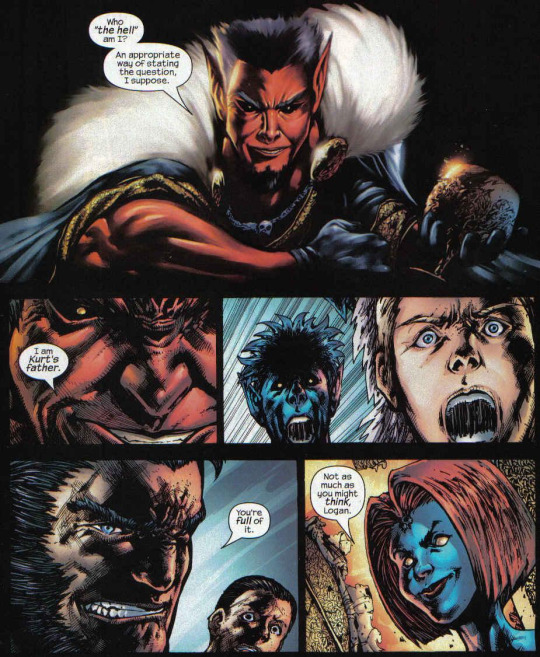
I don't want to belabor Chuck Austen, because I think that Connor Goldsmith is right about his run actually being a camp cult classic in retrospect. However, I think we both agree that the Draco was a misfire, because of how the retcon undermined Kurt's entire thematic purpose as established in Giant-Size X-Men that Nightcrawler was actually a noble and arguably saintly man who suffered from unjust prejudice due to the random accident that his mutation made him appear to be a demon, and because of how the retcon undermined the centrality of Mystique and Destiny's relationship.
X-Men Blue Origins
This brings us to the Krakoan era. In HOXPOX and X-Men and Inferno, Jonathan Hickman had made Mystique and Destiny a crucial part of the story in a way that they hadn't been in decades: they were the great nemeses of Moira X, they were the force that threatened to burn Krakoa to the ground by revealing the devil's bargain that Xavier had struck with Sinister (and Moira), they were the lens through which the potential futures of Krakoa were explored, and they ultimately reshaped the Quiet Council and the Five in incredibly consequential ways.
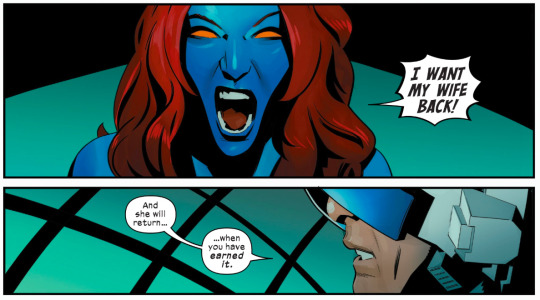
This throughline was furthered after Hickman's departure, with Kieron Gillen exploring the backstories of Mystique and Destiny in Immortal X-Men and Sins of Sinister, and both Gillen and Si Spurrier exploring their relationship with Nightcrawler in AXE Judgement Day, Sins of Sinister, Way of X, Legion of X, Nightcrawlers, and Sons of X. One of the threads that wove through the interconnected fabric of these books was an increasing closeness between Kurt and Irene that needed an explanation. Many long-time readers began to anticipate that a retcon about Kurt's parentage was coming - and then we got X-Men Blue: Origins.
In this one issue, Si Spurrier had the difficult assignment of figuring out a way to "fix" the Draco and restore Claremont's intended backstory in a way that was surgical and elegant, that served the character arcs of Kurt, Raven, and Irene, and that dealt with complicated issues of trans and nonbinary representation, lesbian representation, disability representation, and the protean nature of the mutant metaphor. Thanks to help from Charlie Jane Anders and Steve Foxe, I think Spurrier succeeded tremendously.
I don't want to go through the issue beat-by-beat, because you should all read it, but the major retcon is that Mystique turns out to be a near-Omega level shapeshifter, who can rewrite themselves on a molecular level. Raven transformed into a male body and impregnated Irene, using bits of Azazel and many other men's DNA as her "pigments." In addition to being a deeply felt desire on both their parts to have a family together, this was part of Irene's plan to save them both (and the entire world) from Azazel's schemes, a plan that required them to abandon Kurt as a scapegoat-savior (a la Robert Graves' King Jesus), and to have Xavier wipe both their memories.
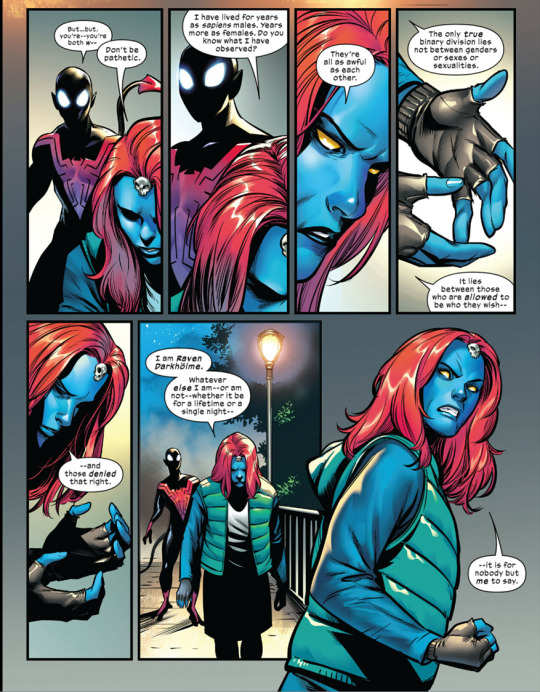
Now, I'm not the right person to write about what this story means on a representational level; I'll leave it to my LGBT+ colleagues on the Cerebrocast discord and elsewhere to discuss the personal resonances the story had for them.
What I will say, however, is that I thought this issue threaded the needle of all of these competing imperatives very deftly. It "fixed" the Draco without completely negating it, it really deepened and complicated the characters and relationships of both Raven and Irene (by showing that, in a lot of ways, Destiny is the more ruthless and manipulative of the two), and it honored Kurt's core identity as a man of hope and compassion (even if it did put him in a rather thankless ingénue role for much of the book).
It is the very acme of an additive retcon; nothing was lost, everything was gained.
I still think the baby Nightcrawler is just a bad bit, but then again I don't really vibe with Spurrier's comedic stylings.
#xmen#xmen meta#raven darkholme#kurt wagner#irene adler#xmen blue#nightcrawler#mystique#destiny#chris claremont#si spurrier#krakoa#retcons#xmen spoilers#hoxpox
223 notes
·
View notes
Text
we should make a collective list of all the retcons in the show. for funsies. here’s the ones I can remember:
Thirteen’s vanishing sister Amy and her girlfriend Amy
Wilson telling Thirteen that from 1990-1991 Sam Carr was Sam Wilson, but then in the next episode a comment is made about them being married ten years ago
Season 1-3 timeline mess of when House started taking Vicodin
“Cursed” saying Chase was 26 and then the writers having his age in his early thirties later in s1 or 2
This isn’t a retcon, it just doesn’t work with the timeline. but saying Amber was in her late 20s
Wilson and Bonnie’s dog’s age I think
#house md#hate crimes md#retcons#AMBER WAS IN HER MID THIRTIES AT LEAST I WILL DIE ON THIS HILL. Like 36ish at least
217 notes
·
View notes
Text
Talking about stupid retcons that I will never accept, (I dont care that it has been over a decade at this point)
Sicarius name being changes to Captain Pythea in the book Consequences because he acts like a big bag of dicks and we cant have the big Hero™ do that.
Let the hero be a dick GW! Let McNeill write his enemies to lovers in peace you cowards!
(has this stopped me from buying models/books/merch or enjoying the hobby in any way? No. I fucking love this hobby, even when it wrongs me like this)
#40k#warhammer 40k#warhammer#ultramarines#space marines#stupid sexy space marines#graham mcneill you crazy bastard#uriel ventris#cato sicarius#retcons#pythea is just sicarius in a silly moustache
62 notes
·
View notes
Text
Errors, “Errors,” and Animorphs
So in a different post I ranted about how a tiny non-distracting unfixable difference between two shirts is not an error in Jurassic Park. IMHO, a continuity gap is only an error if:
It draws attention to itself and distracts the audience
It could’ve been fixed pretty easily in-story
It makes character, plot, or setting nonsensical
Animorphs has continuity gaps of its own. And I have opinions about what we readers do and do not count as “error.” First, an example that’s clearly an error:
I wondered if Tobias had heard my thought. I concentrated. Tobias, can you hear me?
«Yeah,» he said, «I hear you.»
“Did you hear my thoughts before that?” I asked.
«No, I don’t think it works that way. You have to think at me for me to hear.»
—#1: The Invasion
Tobias briefly hearing Jake thought-speak in #1 breaks the rules of the setting; several other books (#2, #23, #31, #33, #46) clearly state that it’s impossible to thought-speak if one is human and not in morph. It’s an easy fix; the re-releases and audiobooks delete this moment, and the graphic novel makes Tobias unable to hear Jake. It distracts the audience; I’ve gotten 5 or 6 separate asks over the years of people going “I was rereading #1, and the weirdest thing...” It’s an error. I can’t say what happened behind the scenes — K.A. Applegate toyed with a thread that was later dropped, or decided to introduce a limitation for plot fuel at a later time. But it’s an error.
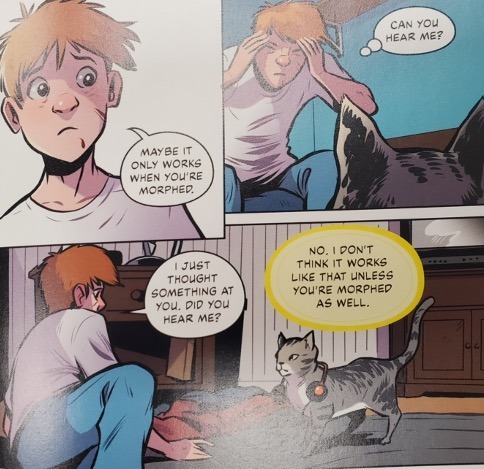
Second, an example that I don’t think counts as an error:
I returned to my life, feeling strange and out of place. That night Jake came over. We went outside.
"I tried morphing the Tyrannosaurus," he said. "Nothing. Didn't work."
"You could ask Ax. He may know why."
Jake laughed. "Yeah, but even if he explains it, I still won't understand it."
—MM2: In the Time of the Dinosaurs [Cassie’s narration]
The kids not being able to morph dinosaurs outside of the Cretaceous Era makes a lot of sense in context. The whole book series would fundamentally change if they could use T. rex — that would become heavily a favored morph for many of them. It kicks off all kinds of plot questions that demand answers: Where do the controllers think the “andalite bandits” got dino DNA? What anti-dinosaur measures would they be forced to adopt? Would the Animorphs’ whole strategy change around having those morphs? How would Rachel feel about everyone but Tobias suddenly having a much stronger morph than her? Would they even bother with contemporary animal morphs afterward?
If the kids are morphing dinosaurs all the time after ~#18, then the series loses a lot of its uniqueness. Applegate has said that most of the inspiration for the series was about trying to help kids understand what it would really be like to be inside an animal mind, with as many animals as possible. That’s part of why so many of the plots hinge on giving the Animorphs an excuse to learn a new morph (e.g. #4, #17, #27, #47, #52) so that we can experience the coolness right along with them. That’s why the war is explicitly about fighting for Earth, nonhumans and all (#7, #23, #53). If it’s not a menagerie of six different critters — including one immigrant from space — rolling up to battle, then it’s not Animorphs. No, it makes no dang sense that sario rip morphs stop working once the rip gets unripped. But the series acknowledges it, and it allows us both to have a unique animal-based story (dinosaurs! Heckin dinosaurs!) without ruining its own premise.
Third, one that I find fascinating because it’s kind of right on the margin:
"What I don't get is why I have to be a girl wolf," Marco grumbled.
"We had one male and one female," Cassie explained for the tenth time. "If two of us morphed into the male, we'd have two males. Two male wolves might decide they had to fight for dominance."
"I could control it," Marco said.
"Marco, you and Jake already fight for dominance, and you're just ordinary guys," Rachel pointed out.
—#3: The Encounter
Later, Tobias’s narration uses the word “alpha” to describe Jake’s morphed behavior — howling and peeing to mark territory, challenging another wolf pack to protect his own.
There is scientific consensus right now, as of the 2020s, that the term “alpha” is an inaccurate descriptor of pack-lead behavior, and that dominance fights between adult males are almost nonexistent. That although wolves usually run in a phalanx-like shape with one middle-aged male and female at the point, this isn’t the result of dominance fights but rather an effort to have the physically strongest wolves absorb blows from rogue prey animals or rival predators. That the dominance fights observed in captive wolves in the 1970s were the result of an ecology error, putting wolves from rival packs into single enclosures. Fox (1972, 1973) gave a reasonably accurate description of how wolves behave if you put a bunch of adult strangers in a zoo together: the young adult males fight, the winner of that fight wins first access to food, and the mate of the winner gets the most resources for her puppies.
However, time rolls forward, and advances like hidden cameras (and the resurgence of wild wolf populations) allow us to watch wolves without needing to capture them first. Mech (1999) follows some such wolves around, and quickly realizes that dominance and submission aren’t nearly as important among wolves who chose to make a pack. Stahler et al. (2002) figure out a better way to introduce stranger wolves in captivity, and get full cooperation among young adult males. Nowadays drones and radio collars get 1000s of times the wolf data Fox had to work with, and reveal intense cooperation with little more than play-fighting among puppies.
The Encounter comes out 1997. Mech publishes the first big takedown of the alpha concept 1999.
Did an error occur anywhere in this process?
No, in that Applegate presumably doesn’t own a Time Matrix and published a book based on the scientific consensus at the time about how wolf social dynamics worked.
Yes, in that the error is pretty distracting — I get drawn up short by it every time I reread #3, and I know others have too.
No, in that the error was corrected in the graphic novel adaptation.
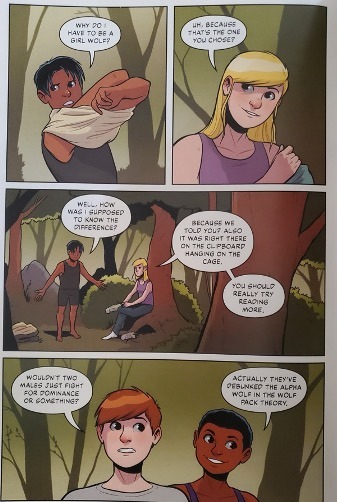
Yes, in that the error is still present in the audiobook, and Michael Crouch delivers the moment about Jake being backed into a dominance fight with all of Tobias’s exasperated humor.
No, in that the error allows for some character moments, both silly (Jake peeing on trees) and sweet (Jake being ready to take on an entire rival pack alone, over a rabbit he doesn’t want).
Yes, in that the error takes away from one of the series’ most fundamental purposes, to educate kids about animals.
Anyway, books are great, science is imperfect, and I think the more we all engage with amateur criticism the more we’re all going to learn about what counts as an error in fiction writing with inspiration in scientific reality.
#animorphs#animorphs meta#continuity errors#retcons#fandom#lit crit#3#1#mm2#there's a related question: if the third graphic novel is also set in 1997#then how does cassie know about the alpha wolf hypothesis being debunked in 1999?#but again#answering that question would make the book worse not better#so i don't worry about it
480 notes
·
View notes
Text
Okay, so in canon, according to the novels, Master & Apprentice (2019), Dooku: Jedi Lost (2019), Padawan (2022) and the guidebook Clone Wars: Character Encyclopedia (2021)...
... Dooku left the Jedi Order a decade BEFORE The Phantom Menace. However, in the fourth episode of Tales of the Jedi, it seems he's still in the Jedi Order by the time of TPM.
That said... if we wanna get technical... they don't explicitly say anywhere Dooku is still in the Jedi Order, in the episode.
But in Dooku: Jedi Lost, we learn he got to keep his lightsaber after leaving the Order...
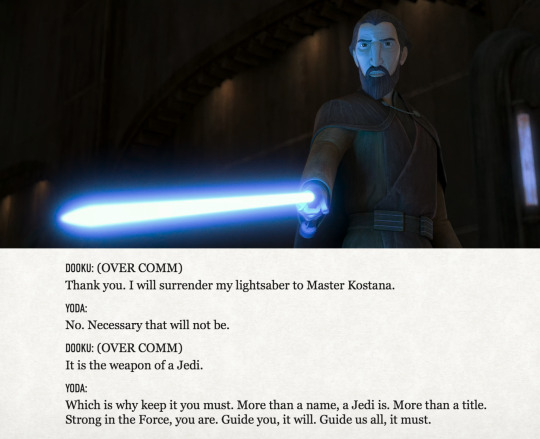
... and in Padawan, they say Dooku visits, from time to time, even occasionally meeting with the Council.
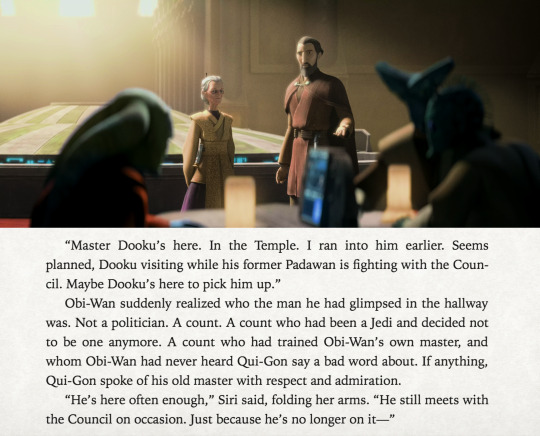
In the episode, we see some passing Jedi nod to him, in reverence. He's referred to as "Master", out of respect. He seems a bit out of the loop, especially when it comes to the Council's conversations and it's because he's no longer on the Council, he's no longer a Jedi.
(Out-of-universe, I'm sure it's because in Dave Filoni's mind "Dooku was never on the Council" and they call him "Master" because he's still a Jedi.)
But yeah... it's a bit of a stretch, but maybe those two sequences in "The Sith Lord" will be retconned as Dooku just "visiting the Temple, as he does from time to time".
That said, if the canon timeline still holds, I gotta say... Dooku looks pretty goddamn good for a 70-year-old!
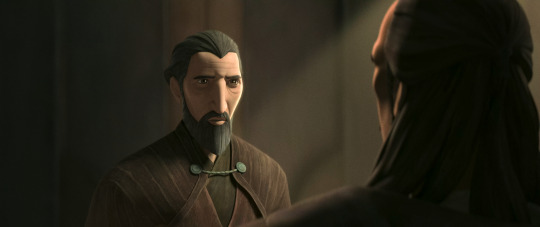
I would've guessed he's in his mid-50s, he and Qui-Gon look about the same age-range!
Creators of comics like Age of Republic: Dooku (2019), Age of Republic: Jango Fett (2019) and the guidebook Secrets of the Sith (2021) figured "he's in his 60s when he left the Jedi Order, in his 70s during TPM, let's make him look like it":
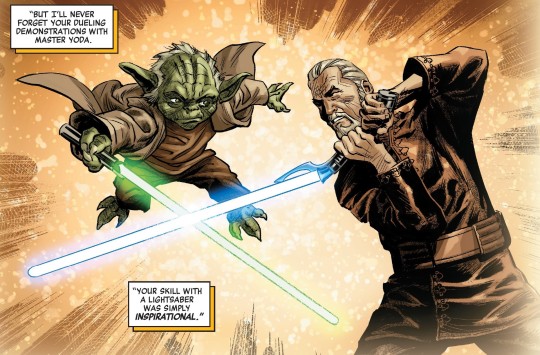


So I dunno.
I'll admit that I do like the implication that if you serve the Light Side, you age at a slower pace (short of spending 20 years on a planet with two suns...!) and the deeper you drench yourself in the Dark Side, the quicker you age.
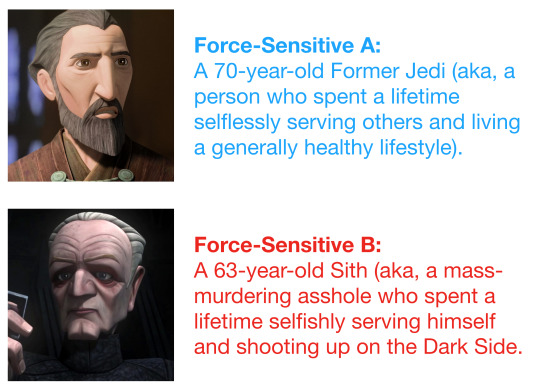
"Choices were made", let's put it that way.
#tales of the jedi#tales of the jedi spoilers#totj spoilers#Dooku#Count Dooku#dooku jedi lost#retcons#expanded universe#qui-gon jinn
1K notes
·
View notes
Text
Hot Take, I think the Bruce fires Dick retcon makes no sense and takes away from both characters.
Like why would Bruce be “oh I don’t want to lose my kid so I’ll fire him” and then adopt another kid and let them be Robin. That makes no sense at all?!
And it completely screws up Dick’s whole thing. Like Dick is supposed to represent freedom and independence. Him being fired takes away his agency in that moment and completely undermines his character motivations.
Also the departure does not have to be good. It can be a mess and Bruce and Dick can fight about it. I just want it to be Dick’s choice, because I feel like that fits better narratively.
So yeah the only thing I liked from Nightwing Year One was how he got the name Nightwing. Also in my Earth au thing Dick does still leave on his terms. I might write about my Earth someday I have like a full timeline.
#batman#bruce wayne#dick grayson#nightwing#dc comics#dcu#dc#dc retcon#retcons#man this one just made me sad#like it just screws them both up so much#like what???#the batman
38 notes
·
View notes
Text

with a face similar to his own
with a face similar to his own
with a face similar to his own
110 notes
·
View notes
Text
“You—you altered their memories?” I took a step back. Faerie arrogance, such faerie arrogance to
change our minds, to implant thoughts as if it wasn’t a violation-
Miss girl says this and then goes and marries a literal mind-reader who fucks with minds like toys and she starts doing it herself😭
#babe wtf#retcon#retcons#how many retcons#sjm critical#anti sjm#feyre acotar#feyre archeron#anti rhysand#anti feysand#tf#spot the retcon everyone
131 notes
·
View notes
Text
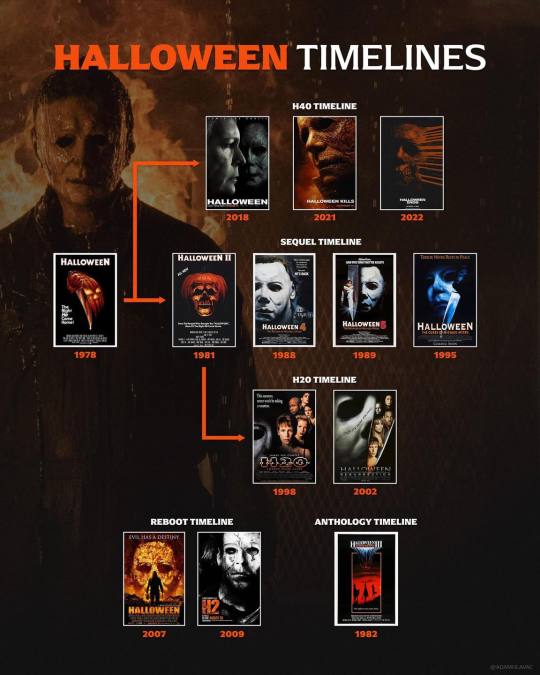
#halloween#michael myers#john carpenter#horror#movies#sequels#retcons#timeline#1970s#1980s#1990s#2000s#2010s
98 notes
·
View notes
Note
I apologize in advance if this gets gets long, just the convo around the next ep of HB has got me annoyed and it hasn't even come out yet
(So I'm mostly talking around the talking points screencapped here: https://www.tumblr.com/chaifootsteps/749126531306160128/apparently-im-lying-about-being-molested-when-i?source=share and your reblog from earlier where Viv liked this tweet: https://twitter.com/lovelyzelda2/status/1784606963583668469?s=46)
I had a bad feeling the discourse would immediately switch positions to 'see? Blitzo enjoys having sex with Stolas! how can you call it extortion when he's clearly fine with it?' (goalposts moving yet again, but anyway...)
OK, so - just a few teeny, tiiiiny problems with this statement here
Compartmentalization. It's entirely possible (and rational) for someone to talk themselves into believing the scenario they've been forced into is 'not that bad', just for their own mental stability
Taking power back. When someone has no power in a situation they'll take what little scraps they can get even if it looks like it makes no rational sense to an outsider. Blitzo is very heavily implied to be the 'top' in the relationship, which allows him to feel like he has some modicum of power, even if all he's doing is being the one to put in all the work to meet Stolas' needs. Paradoxically this can go hand in hand with a learned helplessness - if someone mentally accepts they are trapped in a scenario they might focus on trying to 'make the best of it' rather than escape the situation, which people on the outside struggle to understand
Hypersexuality. Related to the above, Blitzo uses sex as a tool to get what he wants. He's been conditioned by society at a young age to understand imps have little value and that survival means a lack of autonomy over one's own body and time - both things he's had to give up to Stolas to survive. It says a lot when we use the one of the survival mechanisms of an underclass as a means to judge them rather than the system that created it. (And interesting again that calling out the ways the rich literally screw over the poor is one of the main things used to demonize Striker as The Bad Guy). Also saying Blitzo enjoyed the one night stand then is flimsy evidence he's fine with the full moon deal now - he might be more sexually compatible with Stolas than Chaz (not a high bar to clear) but it was clearly pity sex and he dipped and attempted to ghost Stolas right after. For him the sex would've been a one time thing if Stolas hadn't pushed it further. This type of argument is veering into shaming Blitzo for enjoying casual sex tbh, because it's arguing that that should mean he'd be happy to have sex with Stolas again every time after. Nope. Consent works on a situation to situation basis. Being up for it Monday is not a promise you'll be up for it Friday - Blitzo having a one night stand with Stolas is not some kind of invisible 'IOU more sex'
Retconning. Yet again, but it shouldn't go unmentioned. Most of Blitzo's attitude to Stolas' flirting has been annoyance or rejection in season 1, indifference right after their session in Harvest Moon (and more annoyance/rejection to Stolas demeaning him in public at the festival), one tiny suggestion of enjoying their activities in Truth Seekers (and even that can be argued to be just Blitzo enjoying exerting power of Stolas and following through with what he sees as his end of the bargain - Stolas certainly doesn't correct him that he expects Blitzo to reward Stolas for rescuing his life with sex, since sex is all Stolas ever wants out of him), then Ozzie's caps it all off with Blitzo telling Stolas he has some nerve to expect to play at boyfriends when all he's wanted all season long is sex. That's an entire season of Blitzo's attitude towards sex with Stolas being pretty darn consistent
An abuser cannot be X. One of the most pernicious suggestions - moving on to the tweet of Stolas pathetically shutting himself in the fridge, the implication on his side is that someone who is a "manipulative mastermind" must look a certain way. They certainly aren't the kind of person who cries, sobs and shuts himself in a fridge! Never mind that 'I'm so pathetic & harmless, how could you do this to me?' can most definitely be a manipulation tactic.
This is incredibly inline with how Spindle seems to write and see abuse - abusers are only ever these obviously evil caricatures like Stella or Crimson. (And if they have any redeeming features in their eyes, like being superficially charming like Val, they'll be babied endlessly on Xitter). Real abusers are not charismatic or pathetic wet cats, apparently.
It's a reductive and frankly pretty irresponsible line of argument, because an abuser can be anyone and look like any kind of person. How often do abusers in real life get away with it because people don't think beyond 'they seemed so nice? they seemed so charming? they were so sad, so victimized by the other party they kept crying about?'
(this kind of writing is really just a variation of the Wounded Gazelle Gambit outlined here: https://tvtropes.org/pmwiki/pmwiki.php/Main/WoundedGazelleGambit -> i.e. Blitzo gets annoyed/mad at Stolas for a completely understandable reason like the Full Moon deal, being talked down to & demeaned, having his boundaries pushed constanly in Loo Loo Land -> Stolas circa season 2 whines and cries -> fandom falls for the writer's gambit & decides Stolas is the victim because Blitzo is the one who looks mean and abrasive despite Stolas giving him all the reason the world to be that way toward him)
"They're in Hell!" Sorry to bring back and old classic, but I just find it interesting that when someone criticizes Stolas for the Full Moon deal the defence of 'they're in Hell, he's meant to be deeply flawed, the writers are going somewhere with it!' gets brought up, even though the writers are desperate for viewers to think Stolas is not flawed because nothing is ever his fault anymore.
And yet the 'they're in Hell!' excuse is never brought up to explain why Blitzo 'doesn't seem sad enough' that he's being exploited. Maybe because in Hell imps as a class are exploited all the time and he doesn't expect much better? Maybe because Blitzo is already trying to prove his doing better than most of his kind by starting a business? Maybe because the only way to keep that business going is appeasing Stolas?
(it's a common phenomenon that many women do not think they've ever been sexually assaulted, yet when given the defintion they say 'that has happened to me'. they just don't recognize it because of what they think SA is and a lack of education to correct that perception. someone being conditioned not to know what is happening to them is wrong doesn't make what happened to them any less wrong. what it means is no one ever gave them the words to describe it before or call it by its name)
Putting it simply, the 'they're in Hell!' line is only ever used to excuse the behavior of the abuser, yet never as a touchstone to why the victim might behave the way he does
Real life cases / economic factors. This is heavy so I'm going to keep it short but it's important to include since I think we should be fighting back against bad attitudes around consent.
So there have been real life cases of employees who were extorted for sex by their bosses. Thing is, in instances when this went on a long time it sometimes became more difficult to press charges rather than less, even though the victim had been the subject of more sexual assault and rape.
And this was precisely because people rationalized it away. They believed juries would be hostile and would naturally assume 'if you had sex that many times it can't have really been rape, even if you would have lost your job. You didn't cry and weep and scream every single time? Then it can't have been rape'
What they were failing to understand is that economic factors and differences in availability of jobs in different fields mean that some people genuinely can't 'just quit' right there and then. What they were failing to understand is that the victim had become desensitized to the pain of being violated, that they weren't crying and weeping and screaming every time their boss forced them into sex they didn't want. It's why the 'you smiled in a photo one time so you were happy' argument is such BS. People can smile and seem totally put together five minutes before a mental health meltdown when everything that's actually going on gets to be too much.
But instead of blaming a society where someone could be forced into that position, they blamed the individual. The individual was victimized not once but many times - first by their abuser, then by a society that makes it impossible to escape them, and finally by the ones who decided actual evidence was secondary to the fact that a victim suffering a death from a thousand cuts isn't bleeding out dramatically or miserably enough for their tastes.
(speaking of economic factors, Stolas has also used promising money to bodyguard him as a means of getting Blitzo's company. Blitzo spends that episode trying to do his job - 'save it, bitch, I'm working' etc - but Stolas doesn't care about respecting their exchange of money for Blitzo's labour, because what he really wanted was to inappropriately flirt with him in front of his teen daughter. he uses his wealth as further entitlement to Blitzo's time and attention)
Lastly: it's still wrong whether Blitzo 'enjoys it' or not. I feel it's important to stress that ultimately dissecting Blitzo is kind of missing the point here. Because even if Blitzo did genuinely enjoy sleeping with Stolas - if we pretend season 1 didn't happen - it doesn't make what Stolas did any less wrong. There's a reason why sometimes a case will be 'the state VS accused rapist/person who committed domestic violence' i.e. the state prosecuting on a victim's behalf. And that's precisely because the victim is too close to it or is too afraid of the abuser to be expected to press charges. Blitzo can't exactly freely answer the sentence 'did Stolas wrong me? would I have slept with him if I'd had a choice?' if the answer stands to lose him his company, can he?
Put it another way:
Character A uses the fact Character B's life is in danger to get them to agree to a deal where they have sex once a month so Character B can keep their job. Character B is clearly repulsed but later seems to enjoy their monthly meetings. Did Character A do anything wrong?
Describing that scenario outside of the context of Stolas being a sad weepy owl, would anyone hesitate to condemn Character A here? B's 'enjoyment' doesn't change that the initial act was wrong - despite hating fanfics so much, the "it wasn't really rape because the victim secretly enjoyed it" thing is a line pulled straight out of fanfic where the original scenario where the couple 'hooked up' is dubcon at best, rape at worst. it's the last refuge of writers who want to include dubcon elements but don't want to deal with how bad it makes the perp look in the eyes of the reader
It seems obvious to me that the writers wanted Stol!tz to be a messy friends with benefits to lovers, catching feelings type of thing. But they didn't write it that way. And no amount of crowbarring it into that 'it's just miscommunication!' trope will fix the fact that they wrote and animated a sequence in Murder Family where Blitzo clearly doesn't want to say yes to Stolas and would have said no if he'd had an option at that moment
(though at this rate HB will attempt to do the Bad Fanfic trope of 'I secretly wanted it all along!' because retconning everything that happened in s1 is the only way they can think of to 'fix' Stolas without actually, you know - fixing Stolas)
Tl:dr; I'm frustrated with the lack of care in HB's writing since season 2 started, especially with how young some of the fanbase obviously are. But I'm also disappointed. They had a real opportunity to break new ground in depictions of abuse - show how someone could be simultaneously abuser and victim, show how an abuser could rationalize and rewrite reality in his favor, show how all this conflates with class and wealth in an intractable way, show how victims can rationalize their own abuse, etc etc - and they chose to do none of it.
Forcing a ship was just more important than any kind of compassion for their audience (or their literal main character, soon to be demoted to Stolas' sidekick and Emotional Support Imp), so instead all abuse is in the show is either an excuse for cheap drama or a means to attempt to rehabilitate its most frustrating character by pointing at someone else as being 'worse than him' while he's actively treating the one he supposedly 'loves' like garbage
🗣️ i love long essay length anons like this they’re like crack to me.
That last part is getting to me like how is this pairing gonna look when it happens? Like a prince and his obedient minion who serves and protects him from mean women and children, and never gets too feisty or asking too many questions. That’s the end image in my head.
Edit: anon, you care more than the writers do I can promise you that
#helluva boss critical#stolitz critical#the it’s hell excuse#retcons#writing advice#tw mentions of sa
29 notes
·
View notes
Note
If we allready talking bout Naruto:
Thoughts on the infamous Itachi retcon? Think it was planned by the time Itachi was shown to be crying? Or that by the Valley of the End flashback Itachi was "a good guy* or still a more interesting villian that snapped in the most horible way that was human deep down even after all that
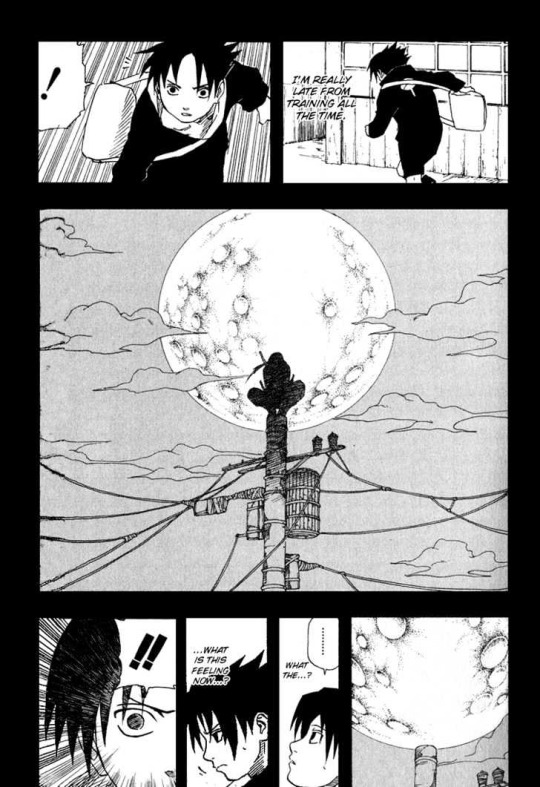
It was certainly not the plan back when the entire thing was first shown i can tell you that.
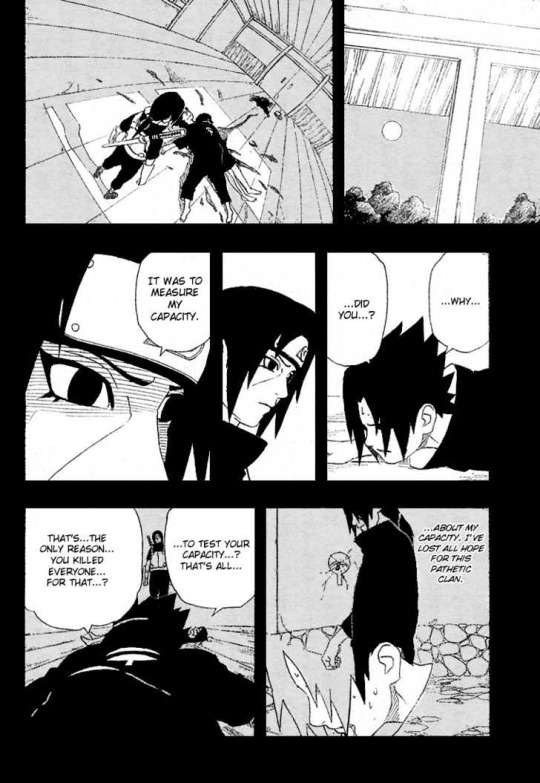
There are only two things pre timeskip, where there was suggested to be anything more than what itachi claimed it to be, and it's 1. that ANBU jacket and outfit he's wearing, and 2. that middle panel on the page above, where Itachi looks just slightly perturbed by Sasuke's question, judging by his lips.
I can believe that Kishimoto had some twist in mind, where it was revealed that elements inside the ANBU put Itachi up to this, and that morphed into Danzo's involvement.
I do not believe for a second, that Itachi was planned as any form of good person. Itachi murdered his entire family, men, women, children except for his brother. He butchered babes in their cribs. He was a monster, who regardless of wheter this was entierly his own idea, or he was offered a chance to do what he'd been planing or considering for a while, he made the choice to take it.
Not only is the entire thing a gigantic pile of nonsensical retcons, all for the purpose of making Itachi look better, but it's a sloppy one at that.

This is how Itachi killed his parents according to the retcon.
It was quick, clean stab in the back, and they were facing the same way, on their knees.

This is how they were killed in the original flashback of this scene.
there was clearly a struggle here, with blood all over the floor, and with his parents bodies splayed out in such a way that it suggests his dad was trying to protect his wife.
Unless Itachi speciffically posed them like that, it's impossible for their bodies to have gotten to this position naturally from how he killed them.
The fact is that Kishimoto didnt know where to go with Sasuke once he killed Itachi... So when he realised that, he decided to retcon his entire backstory to let him go into an entierly different direction, rather than exploring Sasuke in a post Itachi world.
And in the process, he completely rewrote Itachi's personality and character, and instead presented him as the second coming of chritst, as a messiah like figure who could do no wrong, and had only the best intentions.
He wasn't the only one who got this treatment in Naruto's later years either.
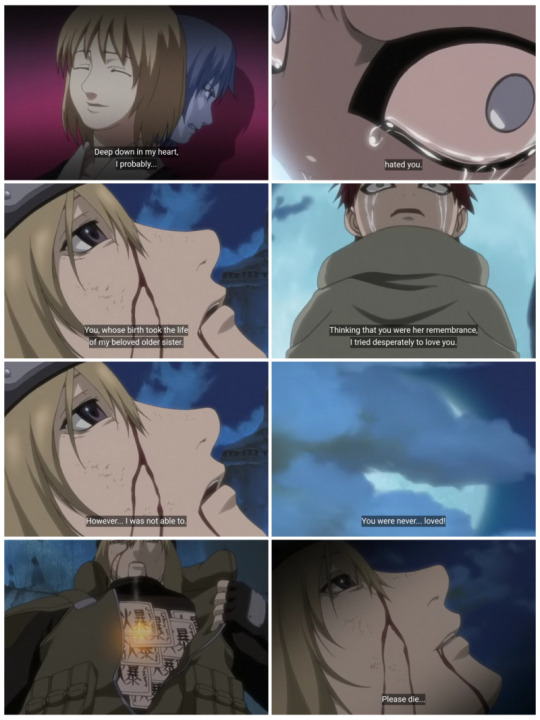
Gaara's backstory, as it was originally portrayed was a very tragic tale, that encompassed what the Naruto world was actually about.
This is the world of the Shinobi, a world full of tragedies, and personal sacrifices, hate, love, and the broken children it left in it's wake.
the story of Naruto as it was originally presented, and shown before the pain saga ended at one of the worst turning points in manga history, was the story of the broken children this world left behind. Naruto, Gaara, Sasuke, Pain, Lee, Kakashi, Obito, Zabusa, Hinata, Neji, and on and on and on it went.
This moment, where Gaara's uncle, the one person he thought loved him lays out the truth, is a powerful, tragic moment that showcases the reality of treating children like superpowered nukes.
It destroyed this entire family. It destroyed gaara's mother by taking her life, destroyed his uncle by forcing him to try to love a child he never could, and it destroyed his entire family outside of it, by making the relationship between gaara and his siblings into one fear and hate.
It's very, very poignant. It would be a real shame if it was completely retconned, and his uncle actually only said these things on order from his dad, completely removing the entire point of the scene.
and That is exactly what happened.
I could go on, but the big, big problem with later naruto, is that when confronted with the question of how Naruto would change this brutal, cruel world, rather than have him come up with a real answer, the very fabric of the setting changed.
The 5 hidden villages were united against a cartoonishly evil villain, who used a cartoonish army of cloned henchmen and ressurected zombies. The fact that the problem was always the ninja system itself as it existed, and not the existence of the 5 superpowers and their direct animosity with each other was never adressed, and villains and black and grey figures were suddenly given the white brush, and would make moral heelturns as worst excemplified by Itachi and Orochimaru.
Addmitingly a lot of everything related to the Itachi Retcons started a bit earlier than Pain ressurecting everyone(thus destroying the entire point of the arc, and setting the stage for cheap non deaths from here on), but that only goes to show that while that was the decisive turning point, it began a bit earlier than that.
16 notes
·
View notes
Note
So in the early days of the X-Men, was Jean both telekinetic and telepathic? Or just the former and the latter was locked away, I think is what I've heard. And has Xavier ever showed any telekinetic abilities, or is he just a super strong telepath?

(credit to Kirby Without Words)
So this is an area in which there have been a LOT of retcons, some I like better than others. When Jean Grey first appears in Uncanny X-Men #1, she's a telekinetic pure and simple. During the Silver Age, at one point Jean's telepathic abilities additionally manifested as part of a complicated plot involving her being the one student aware that Professor X had faked his death once again, and she became one of the first mutants to have two powers.

Then in 1981's Bizarre Adventures #27, there was a major retcon that Jean Grey's telepathic abilities were actually the first to awaken long before her telekinesis. Her childhood friend Annie Richardson was fatally struck by a car while playing with Jean at their suburban street in Annandale-on-Hudson nearby Bard College. This event caused Jean's telepathic powers to activate as she experienced her friend's death from the inside, which caused massive crippling depression and an inability to control her psychic powers that eventually motivated her (horrible) parents to bring in Charles Xavier to help - and he ultimately decided on a strategy of installing psychic blocks to suppress her telepathy until she became older and better able to handle it.
I have very mixed feelings about this retcon. On the one hand, the Annie Richardson event is a classic traumatic backstory and one that advances a lot of interesting themes for Jean Grey in terms of her otherworldiness and her unique perspective on mortality. On the other hand, I feel like the whole business around Professor X installing psychic blocks leads to a pattern of midreading of the Dark Phoenix Saga as one of flawed and corrupt patriarchs unable to handle the cosmic feminine - when the whole point was that Jean established the psychic blocks as a way to control the Phoenix Force while remaining human, and it was the elimination of those blocks at the hand of greedy, self-interested, gaslighting, manipulative, sexual predators that ultimately brought the Dark Phoenix into being.
Professor X has occasionally demonstrated telekinetic abilities, mostly in the Krakoan Era.
#xmen#xmen meta#jean grey#telepathy#telekinesis#retcons#professor x#charles xavier#dark phoenix saga#phoenix saga#phoenix
22 notes
·
View notes
Text
Massive kudos to Matt Fraction & Tom Brevoort for retconning John Byrne’s creepy weirdo crap with Reed Richards & Susan Storm!
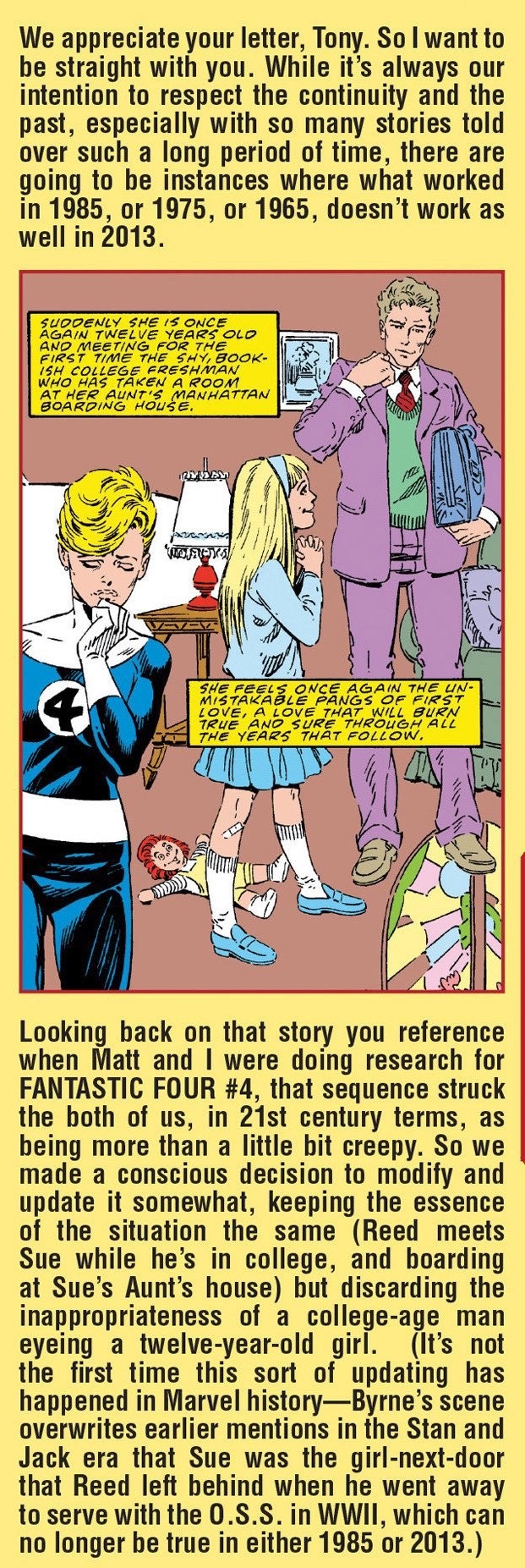
#fantastic four#letters pages#matt fraction#tom brevoort#John Byrne is a creep#reed richards#mister fantastic#susan storm#invisible woman#retcons#trivia#marvel comics
27 notes
·
View notes
Text
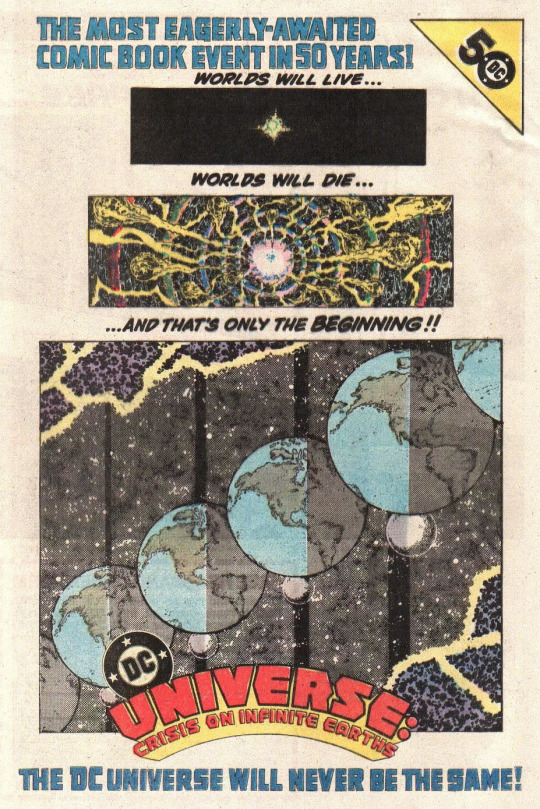
March 1985. Whatever else one may say about the Crisis on Infinite Earths, it was a triumph for truth in advertising: Worlds lived, worlds died, and the DC Universe was never the same. A cynic might add, "And nothing ever made sense again," since the event kicked off almost 40 years of retcons, revisions, and successive reboots, which DC used to internally describe as "white events," after the cataclysmic moment in CRISIS ON INFINITE EARTHS #10 where the original multiverse was shattered and recreated:

Even before the Crisis event was ever conceived, DC had a long history of fairly dramatic editorial and creative shifts, some of which hung on specific story events (like the de-powering of Wonder Woman in 1968) and some of which did not (like the inauguration of Batman's "New Look" in 1964). With the benefit of hindsight, it's possible to make some general observations about editorial revisionism and efforts to tear down and rebuild internal continuity:
It's ultimately easier (and more effective) to ignore than to change. When Julius Schwartz became Batman editor in 1964, he dispensed with many characters and concepts that had been staples under his predecessor, Jack Schiff, such as Batwoman and Bat-Mite. With one exception, there was no story explanation of where they'd gone — they just stopped showing up and were soon forgotten. The exception was Alfred the butler, who was killed off dramatically in DETECTIVE COMICS #328. When the producers of the 1966 Batman TV show decided to incorporate Alfred into that series, Schwartz was obliged to resurrect him, in a singularly preposterous way, after which he was regarded as indispensable. By contrast, while most of the characters who'd simply been ignored also returned, it was much later and generally in quite minor ways; their long absence reduced them to marginalia that could be incorporated or not, as seemed most useful.
Crossovers are the most serious and persistent enemy of change. The nature of company-owned comics is that the characters will inevitably show up in crossovers, team-ups, and events of various kinds, often written, drawn, and edited by people who aren't familiar with the finer points of the characters' history, inevitably resulting in troublesome contradictions, up to and including characters who were previously supposed to be dead inexplicably popping up alive. The more convoluted a change to a character or their history, the more likely that it will misrepresented, accidentally undone, or just ignored the next time the character shows up in a series other than their own.
A true line-wide reboot is commercially infeasible. A publisher like DC or Marvel has many different titles at once, and at any given time, some of them are selling better than others. If a title isn't selling well, there may be nothing to lose by rebooting it or making drastic changes to its characters and direction, but doing that to a series that's currently a hot seller is foolhardy. So, the bestsellers will generally stroll through a "white event" with only minor cosmetic adjustments, while weaker titles may undergo a whole series of radical reinventions. If the former bestseller goes into a slump and one of those radical reinventions transforms an underdog into a hit, the situation will be reversed. Surely this won't backfire later …
Timing is everything. A lot of the confusion that resulted at DC in the wake of the Crisis stemmed from the fact that different revisions happened at different times. For instance, the headaches surrounding Hawkman began in large part because of the editorial decision in 1990 not to treat the Tim Truman HAWKWORLD series as a kind of "Hawkman: Year One" (which is how it was conceived), but rather as a reboot, even though that threatened to retroactively remove the Hawks from books like JUSTICE LEAGUE, which had become very popular following its most recent revamp. This kind of thing creates situations where creative teams have to come up with desperate contrivances to explain retroactive changes to very recent stories. Having Hawkman and Hawkwoman stop showing for Justice League adventures for a while wouldn't have been a big deal, but trying to assert that the Hawkman and Hawkwoman who'd previously appeared were either never really there or were actually somebody else was another matter, and the problems this created were never fully resolved.
Continuity-tidying for its own sake is almost always a creative dead end. This is a lesson that Nelson Bridwell and Roy Thomas demonstrated over and over throughout the Bronze Age: It's one thing to have some flashbacks, if it serves the story, or maybe to retell a character's origin with a few nips and tucks, but if your main purpose is to explain, e.g., why Namor once wore the wrong shorts, the results are likely to be either silly or tedious. This hasn't stopped DC and Marvel from wasting a lot of ink and paper on specials and miniseries that exist to retell earlier stories in an updated, continuity-compliant manner, usually to no good end. The fundamental problem with such things is that their main object is to regurgitate familiar older stories (if they weren't familiar, there would be no point in retelling them) while urging readers who have read the original version (who are the most likely audience) to ignore their lying eyes. This is, with very, very few exceptions, a dismal exercise that routinely defeats even usually reliable creators like John Ostrander (see for example the tiresome 2001–2002 JLA: INCARNATIONS), and frequently results in yet more contradictions to explain or ignore.
The bottom line is that while you can blow things up all you want, the likelihood that they can be reassembled in a clearer, more cohesive way is really quite low, and diminishes the more frequently you try.
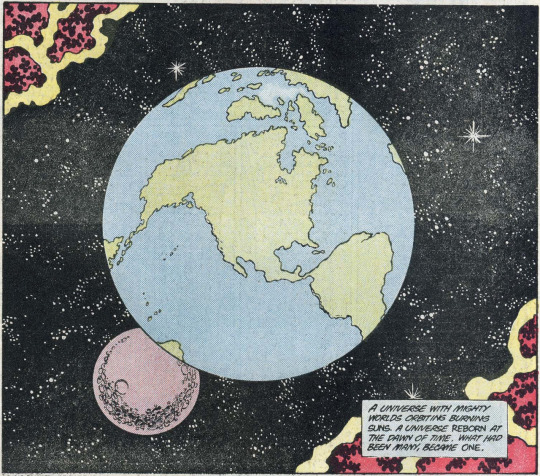
I want to be clear here that this isn't a criticism of the CRISIS ON INFINITE EARTHS series (which has many virtues, along with some significant flaws), or even any of the individual revisions and retcons that have followed, some of which are, in their own right, perfectly fine. The dilemma is that the project that an event like this represents is ultimately a doomed one. It might spark some commercial interest, at least briefly (which is of course at least half the point), but simplification and unity are just not in the cards and probably never will be.
#comics#crisis on infinite earths#marv wolfman#george pérez#jerry ordway#retcons#retroactive continuity#hawkworld (both the truman mini and the ostrander ongoing)#is actually quite good and its troublesome continuity impact#would have been almost entirely avoidable#just as the continuity headaches with wonder woman and donna troy#could have been avoided by treating the first year of the relaunched wonder woman series#as taking place “a few years ago”
22 notes
·
View notes
Note
Something I've been wondering for a while is, what is your take on retcons? Or serialized stories where the authors change their minds partway through, causing words that meant one thing when it was published to now mean another?
For instance, a LOT of A New Hope is very different now after Empire, the Prequels, and even Rogue One.
Should we differentiate between how the story would have originally been interpreted vs the new context, or just say the story's meaning in light of what it is now?
...I think it depends on how much sense it makes toward the serialized story's main point.
Because with a serialized story, the whole idea is that part 1 is just part 1--the creator's not done saying what they had to say, so there's technically still time for changes--but it has to be within reason. And that reason is determined by how much has already been said and what the main point of the story as a whole is.
For example:
George Lucas already said "Luke Skywalker's father was killed by evil, and his character flaw is looking out at what could be and trying to rush to control the outcome; he needs to learn faith." In A New Hope.
But he wasn't technically finished telling the story because Luke comes back in An Empire Strikes Back. So George Lucas' retcon, that Luke's father is actually still alive, is fine--because it works within the boundaries and natural progression of what's already been said. "Luke's father's killed by evil and he needs to learn faith = Luke's father's old SELF was killed by evil, and getting blindsided by the fact that he's still alive will help Luke learn faith." Natural progression.
What I mean by "retcon" is "storyteller started to say something, then doubled back and decided to say it a different way."
They're not changing what the story is meant to communicate; they're just shifting some words around to say it more clearly. I think of good remakes the same way.
But!
If a storyteller starts to say something, then doubles back and changes the words they're using to communicate (changing who the character is, how they intentionally responded to a given situation, etc.) so that the thing the story was meant to communicate in the first place is DIFFERENT, and the changes CONTRADICT what's already been said because of that--
--then it's bad.
So.
Luke learning in ESB that his father wasn't killed by evil like ANH said, but is evil, which makes his need for faith-over-fear greater? Good retcon.
Rey learning that her parents weren't "nobodies" like TLJ said, but actually they were related to somebody important like TROS said, which changes her previously-established need to stop thinking so much about herself and just do what she can humbly? BAD retcon.
Ruined her character arc. Weakened the main point of the story. It was a retcon that basically did the storyteller's equivalent to this communication blunder:
Beginning of Sentence: "The happy dog jumped--"
End of Sentence: "The happy dog jumped flat on his back because he was sad."
That's as clear as I can make it 😅 Does that answer your question?
#retcons#writing#retcon#storytelling#character arc#character arcs#characters#star wars#sequel trilogy#Rey#Luke Skywalker#mark hamill#George Lucas#asked#answered
15 notes
·
View notes